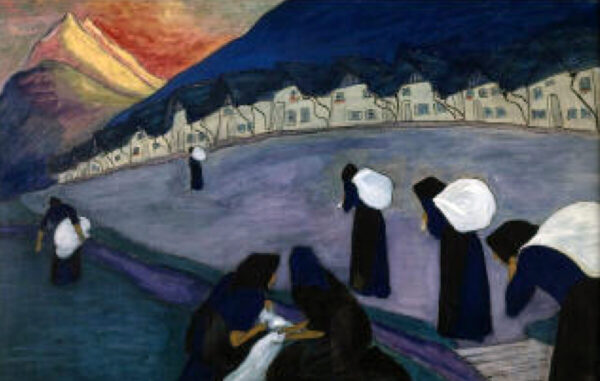NIÑOS DE LA POBREZA ETERNA
(an ovillejo after Fidelio Ponce de Leon’s “Niños”)
In Rembrandt hues they pause before
coarse nature,
abject children who can’t escape
this drab landscape—
nor its archives of oppression
and desperation.
Barren famine distends them
into el Greco perspective,
babes suckling on the effects of
coarse nature, this drab landscape—and desperation.

*
DISAPPEARED DREAMS
As this place at the foot of the mountains
moves from dark into day,
black-clad women bend under
bone-white bags draped over shoulders.
Stealing people’s dreams along the blue avenue,
these shadow babushkas
grip full sacks in their left hand,
holding our reveries like bales of cotton.
One kneels at the road’s shoulder, having dropped
her duffel, revealing her face
from beneath a sooted cowl
had any vigilant villager been aware.
Another stops, stoops to scoop back
the spilled contents but worries
after the distance lost by the delay
as a trio of doppelgangers
trudges past, bringing their bounty
to the realm of Morpheus
where demons can gather
to dine on our evening’s fantasies.
*
THE GREAT GOOGLE WARS OF THE EARLY 21st
The battlefield splayed across the tile chessboard
of a twenty-first century writing lab.
The combatants: one anonymous, stakes his slab
perched on a stool, a Goliath who perches
over a search engine named Google.
The challenger, David, his paltry weapon:
a hand resting, palm down,
in the index of the hardbound
pages of Sonnets by Shakespeare.
Perpendicular in their positions,
the pair commence their decided duel:
“What number contains the phrase—?”
“Where do we find these images displayed?”
The clack of the keyboard sounds
against the flip of turning pages,
sounding like the swish
of a sling slicing the air.
Not much more sound emanates from this sphere
as the duel of searches continues. In the end,
the combatants draw a tie, but there is fear
that the digital giant of googling—
so ubiquitous a thing, its very name became
a verb—may ascend, to destroy and replace
the tactile pleasure of pages,
the smell of their leaves, the feel of their edges,
relegating books to the Museum of Bygone Ages.
*
Photo credit: Ariana Comacho
